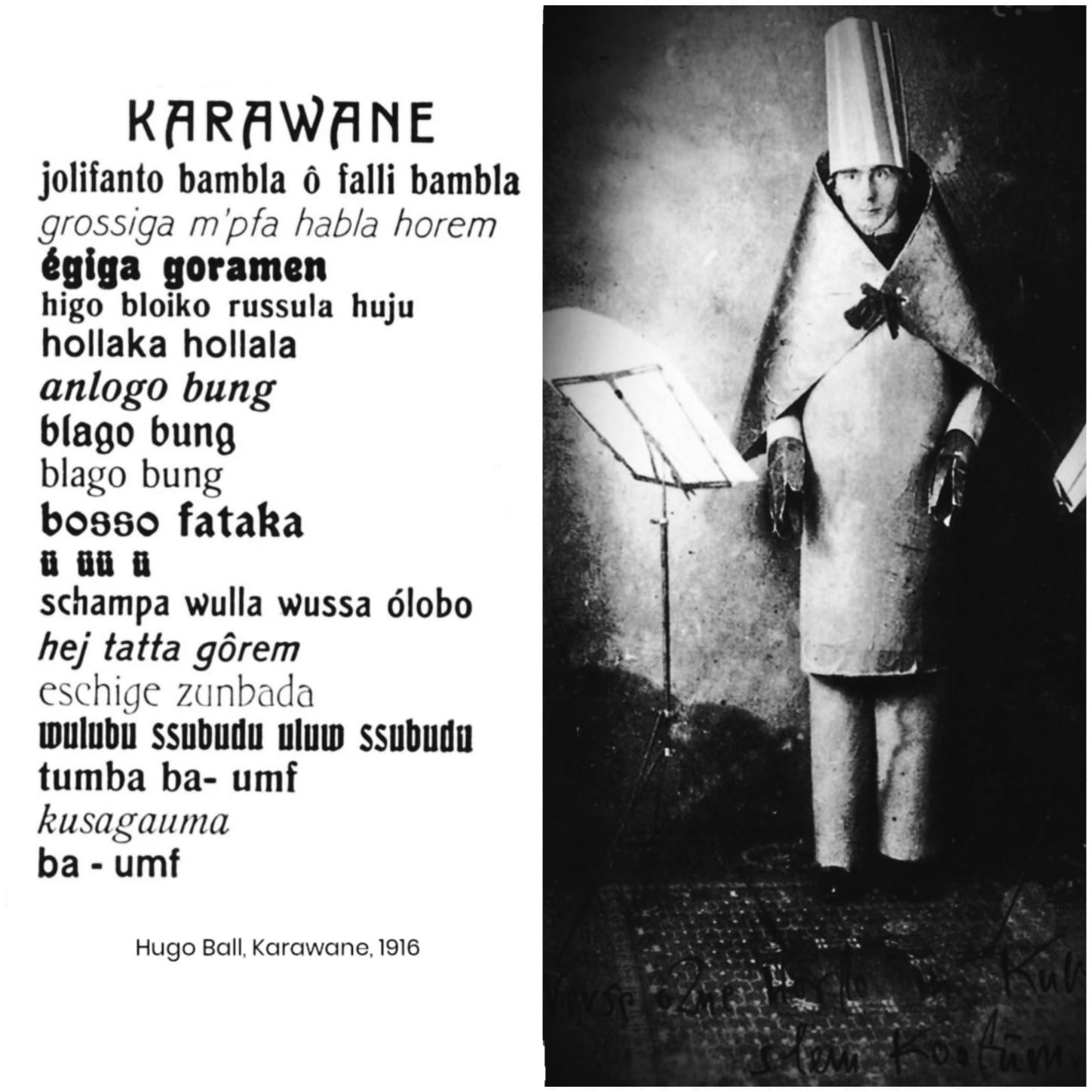sound poetry 2021

UnƧightly [Sound Poetry]
A juried selection from soundpedro artists of sound poems, from classic recitation to speecherly encryption.
Intro start time (00:00)
Liquid Communication - the2vvo (Lena Pozdnyakova and Eldar Tagi) (00:07)
sss ko mmmm - Akari Komura (01:08)
No Oney - Karena Massengill (02:12)
WEHYA HAWEH YO - Martin Espino (02:52)
The Tiger - Michael Mersereau (03:57)
S'deuuur [duet w/ Bird Lady's minion] - Flamboyant Hag (07:51)
Sirin - Sumio Kobayashi (08:57)
Mapa Paisagem - Aglaíze Damasceno (09:51)
Till the Worlds End - Michael Mersereau (10:58)
Ahh! Sploco - Kali Sahu (12:49)
GEHHALGOD - mansplainertainer & the graphettes (13:38)
sound poetry radio & video
A special program of sound poetry presentations curated by and featuring Tim Gaze.
~~~
Sound Poetry Videos
by Tim Gaze & Miron Tee
Improvised videos by Miron Tee for audio tracks from Tim Gaze's album Shapes.
Intro (00:00)
Burbling (00:07)
Phonetics 1 2 3 (11:15)
~~~
Sound poem mix
Track listing:
Vox 2 (excerpt) - unreleased (2013)
Electronic music- NOISES & VOICES (2009)
Miron Tee remixed by Tim Gaze - collage XX7 - unreleased (2012)
phonemes mix - unreleased mix of prior versions (2021)
backwards double - cd w/ Unusual Work no. 22 (2017)
Wind and Water (excerpt) - released on Meat Market Music as creative commons free track (2011)
Jungle or swamp into cave - Neo (2009)
Tim remix of Tim - Exeter Hotel Sound Poetry (Live & Remixes) (2009)
phonetics 1 2 3 - Shapes (2020)
vocal impro - unreleased (2010)
Copperpipe Radio live to air 24 October 2020 (excerpt) - Copperpipe Radio Audius (2020)
TJ Ruminations (Tim Gaze & John Brennand) - 8 Dec 2019 part 1b (excerpt) - unreleased (2019)
Vox 2 (another excerpt) - unreleased (2013)
all tracks written & performed by Tim Gaze unless credited otherwise
CC Attribution license
links:
https://post-asemicpress.bandcamp.com/album/shapes
https://archive.org/details/ahr-004TimGazeAndDavidCurnow-NoisesVoices2009
https://archive.org/details/ahr-007TimGaze-ExeterHotelSoundPoetryliveRem...
https://archive.org/details/ahr-010TimGaze-Neo
https://soundcloud.com/tjruminations
https://soundcloud.com/tj-ruminations
https://www.confrariadovento.com/revista/numero10/musica.mp3
https://audius.co/copperpipemike/live-in-the-pipe-sat-8pm-e1-tim-gaze-15...
~~~
Sound Poetry etc: A Radio Show for the Human Voice
"Humans use their voices to speak language and sing songs. Beyond speech and singing, we humans make many other sounds. Our ancestors played games with their voices before they could speak, imitating birds, animals, insects, the wind and each other. They also made sounds which didn't resemble anything else, which were new and strange. We can describe these non-singing, non-talking sounds as sound poetry.
There's a lineage of sound poetry which considers Kurt Schwitters' Ursonate, written from 1922 to 1932, as the first serious work. My notion of sound poetry includes the Ursonate, but extends to the sounds made by children when they're learning to speak, from the highly trained to the completely untrained.
As well as being an area of vocal creation, we can think about sound poetry as a genre of recorded sound, alongside all of the genres of music and spoken word. Henri Chopin, one of a generation of French poets who used the reel-to-reel tape recorder as their instrument for composition, is central to my idea of recorded sound poetry.
The Canadian poet Paul Dutton invented the term "soundsinging" to cover vocal techniques beyond those typically used in melody-centred singing. The commonly used term "extended vocal technique" is problematic, in that it implies that melody-centred voice is the core part of singing, and that anything else is an extension of this core. For this reason, I prefer Dutton's term. Sound poetry and soundsinging overlap to a large extent. We're in a very interesting area, where both avant-garde poets and children can participate.
I was recently offered an opportunity to host a regular internet radio show, with complete control over the content. After considering the possibilities, I decided that I would focus on sound poetry and soundsinging, and chose to title the show Sound Poetry etc. My remit expanded to include a broader range of material, such as field recordings of animals, speech synthesized by computers and experimental radio plays (German hörspiel). The emphasis is on unfamiliar manifestations of the voice. Thanks to Michael Brown and his project Copperpipe Radio for broadcasting my show."
~ Tim Gaze
Mount Barker, SA, Australia (Peramangk traditional lands)
further reading
http://www.fen-net.de/christian.scholz/lecture1.html
https://www.routledge.com/Voices-Found-Free-Jazz-and-Singing/Tonelli/p/b...
Sound Poetry etc episodes with track listings
https://archive.org/search.php?query=%22sound%20poetry%20etc%22
Themed episodes:
ep 3: all Italian
ep 5: speech synthesis
ep 7: human vocal production
ep 11: all South American
ep 15: Textsound.org
ep 17: all Australian
ep 21: all Canadian
ep 24: Kurt Schwitters' Ursonate
short eps 29 & 30: Swedish Text-Sound
short eps 47 & 48: African & African Diaspora
short eps 53 & 54: Disability
Copperpipe Radio
https://www.copperpiperadio.com.au/

FLOOD invited artists to submit sound poems in honor of Hugo Ball (died September 14, 1927), creator of "Karawane," (Cabaret Voltaire, 1916). We requested recitations of an original sound poem or of another's work, with a deadline of October 17th in recognition of Zang Tumb Tuuum: Adrianopoli ottobre 1912: Parole in libertà (Zang Tumb Tuuum: Adrianople October 1912; Words-in-Freedom) an evocation of the sounds of mechanized war.
Sound poetry occupies the overlap zone between music and speech. It seeks to capture the musicality of language free of any meaning. It is language abstracted to the point of not belonging to any language group or family. It approximates or appropriates the sounds of language; it may turn any sound into a sonic approximation of language.
Keep in mind that a continuous strand of "traditional" onomatopoeia does not constitute sound poetry (e.g. "POW KABOOM POP etc."). These words can be part of a poem but do not constitute the whole thing.
Reference/examples:
Sound Poetry on Wikipedia
Video intepretation of Hugo Ball's Karawane. Excerpt from 100 Years Dada, Rechte bei Arte, Johannes Gees.
17 recordings of Karawane by Hugo Ball read by LibriVox volunteers.
Return to soundpedro2021 main page
